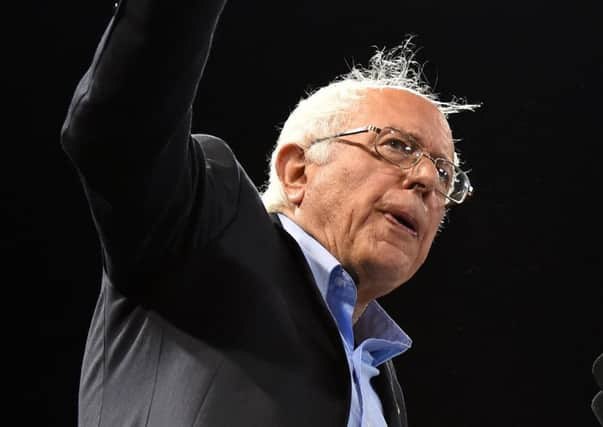Sanders takes Oregon primary while Clinton wins in Kentucky


Tuesday’s primary in Kentucky was too close to call with Mrs Clinton leading the Vermont senator by less than half of 1 per cent. Closing in on the Democratic nomination, Mrs Clinton declared victory in Kentucky nonetheless, telling supporters on Twitter: “We’re always stronger united.”
Trump won the GOP’s Oregon primary, the only Republican contest on Tuesday. In a sign of his pivot into the general election, his campaign announced that it had signed a joint fundraising agreement with the Republican National Committee that will allow it to raise cash for both his campaign and other Republican efforts.
Advertisement
Hide AdAdvertisement
Hide AdAfter months of discord within the GOP, Democrats displayed new signs that it could have trouble uniting around Mrs Clinton’s candidacy as Mr Sanders ploughs through the end of the primary calendar in mid-June. Mr Sanders will need to win about two-thirds of the remaining pledged delegates to end the primary season in a tie but is not letting up.
“Before we will have the opportunity to defeat Donald Trump, we’re going to have to defeat secretary Clinton,” Mr Sanders said on Tuesday night to cheers in Carson, California.
Mrs Clinton ended the night with a commanding lead of 279 pledged delegates over Mr Sanders and a dominant advantage among party officials and elected leaders known as super-delegates.
The outcomes in Kentucky and Oregon did not dramatically change the delegate count and the former secretary of state remains on track to clinch the nomination on 7 June in the New Jersey primary.
But Tuesday’s elections followed a divisive weekend state party convention in Nevada in which supporters of Sanders were accused of tossing chairs and making death threats against the Nevada party chairwoman at the event in Las Vegas.
Supporters argued that party leadership had rigged the results of the convention in favour of Mrs Clinton.
In a sign of the tensions between the two sides, Sanders issued a defiant statement dismissing complaints from Nevada Democrats as “nonsense” and said his supporters were not being treated with “fairness and respect.”
Later, in California, Mr Sanders said the party could “do the right thing and welcome into the party people who are prepared to fight for real economic and social change”.
Advertisement
Hide AdAdvertisement
Hide AdHe said the other option would be to “maintain its status quo structure, remain dependent on big-money campaign contributions and be a party with limited participation and limited energy.”
Mr Sanders pointed to polls that show him in a stronger head-to-head match-up against Trump than Mrs Clinton. With his victory in Oregon, the billionaire businessman now has 1,160 delegates, putting him within 77 delegates of clinching the Republican nomination.